Graham Reid | | 6 min read
Time Zone (Afrika Bambaataa, Bill Laswell, John Lydon): World Destruction, Industrial Remix (1985)
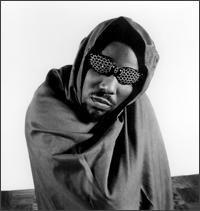
He answers the phone exactly as you
might expect - a booming, stentorian tone like some Old Testament
prophet and commands: “Speak.”
We speak . . . and the voice changes
into the quiet tones of unassuming politeness as he patiently
explains his political philosophy -- and there's a lot of it.
For this is Afrika Bambaataa, head of
the Zulu Nation, an organisation of New York gang affiliates formed
in the mid-Seventies and now hip-hopping and funk-hopping on the
charts.
Bambaataa has just returned from an
extensive European tour and heads back again in a fortnight to
promote his new album The Light and his latest single Reckless, which
features members of UB40.
“People don't want to think about
religion too much, they think they're so modern with all this
technology. But it’s all written in your Bibles and Holy Korans
that certain things will happen at this time but you've got to look
at your past to see what's happening in the present and that’s why
I write certain songs
“But if you start speaking
message-type songs some people don’t want to let those kinds of
records go too far. I try to make records which wake up minds because
it’s getting heavy out here with racism' and poverty and wars.”
All this religious philosophy sounds
pretty heavy on a phone line, too, and you can see why hip-hopper
Roxanne Shante has said, “People have got fed up with being
lectured as if it was their mother and father. Who wants to go to a
party and be lectured? You can stay at home to hear that."
True enough, but Bambaataa combines the
message with a killer dance floor groove and he isn’t going to stop
just because some people don't like to hear what he’s saying.
He's been going his own way for too
long now.
Running wild in the South Bronx
streets, he grabbed on to music in the early Seventies and started
DJ-ing while still at school. His style then, as now, was to take the
best grooves and pull them together.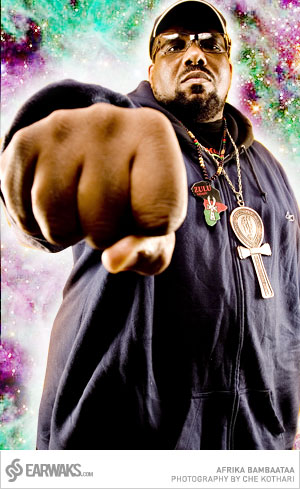
Along with Grandmaster Flash, Bambaataa
is credited with creating the first phase of rap and hip-hop. But
even then he was taking the music elsewhere when he fell under the
influence of Black Muslim teaching: “I was heavily influenced by
the beliefs of Elijah Mohammad and the teachings he gave Malcolm X
and Muhammad Ali and others. Everything he said about dealing with
life, nationalities, religion and self.”
“The Creator has sent prophets and
messengers to warn everyone to get back to righteousness and he has
also done it through music with prophets like Bob Marley, Sly and the
Family Stone and John Lennon who tried to wake people up to what's
happening around them.”
So Bambaataa's message is one of
universal love . . . and bop till you drop. He figures if you hit
people though the feet then their heads will follow.
“Some people don’t want to hear the
message so you put something in there for them to dance to. They
might dance 10 or 20 times and still never hear the words but then
something might just grab them and they’ll hear words like ‘world's
racial war’ and want to know what I'm singing about,"
The dance groove Bambaataa was laying
down wasn't heard on record until 1980, however when he recorded Zulu
Nation Throwdown Part One for the small Paul Winley Records label. He
then shifted to the Tommy Boy label and under the eye of Arthur Baker
recorded the funk-phenomenal Planet Rock 12.
Planet Rock is considered a milestone
in the funk world and his next release got to an even broader market
when it was picked up for the soundtrack of Beat Street.
In the following few years Bambaataa
turned himself into one of music’s foremost collaborators. He
recorded with James Brown and John Lydon and the new album rings in
Nona Hendryx, Bootsy Collins, Sly and Robbie, George Clinton, Boy
George and others.
Whatever direction Bambaataa goes, he
ties it all to some kind of social philosophy, often a little off-the
wall.
World Destruction, with his band Time
Zone and featuring John Lydon, was inspired by seeing a film on
Nostradamus and Bambaataa is still convinced we are living in the
last days.
"He [Nostradamus] said there would
be a war between Islam and Russia with America, and you can see than
happening already. There aren’t going to be any
communists-versus-Americans because you can see the Russians and
Americans are cooling out, and the Islamic nations are rising up.
“That's why I wrote World Destruction.”
He launches into a lengthy
domino-theory analysis of confrontations around the globe which ends
with nuclear explosions and people fighting their local police
forces. It's wild stuff but Bambaataa speaks with powerful conviction
and then fires off a salvo in the direction of ghetto problems.
“It's getting worse growing up now
with this new drug called crack. I’ve been all over Europe telling
people if they see people bringing this stuff in -- I don’t care if
it’s from the Government on down -- they must be destroyed.
“This drug will mess up families,
your daughters will become whores, some of your male people will
become dissatisfied with themselves and end up killing your children
or grandmother.
“This drug is serious so don't let it
into your country.”
Bambaataa is on a roll and the words
don’t stop coming.
"Everyone needs education and to
get rid of the history books they've been using and write the truth
and show what really happened and what black people in Africa, the
Chinese, people in New Zealand have given to the world.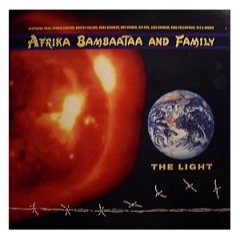
“That will mean new generations will
come up and won't hate. They may not love each other but at least
they'll respect each other.”
Bambaataa's vision of the world-to-come
infiltrates everything he does. He keeps his eye on record companies
which he says are “ripping off rap artists like they did with
doo-wop" and "people who have jumped in on hip-hop because
of the money."
And he has left behind companies which
haven't been in behind him. But he’s a hard man to pin down
musically and claims the techno-pop of Kraftwerk and the Yellow Magic
Orchestra as his influences as much as James Brown or George Clinton.
“A lot of people will be confused by
The Light album. It's not hip-hop, it's dealing with different brands
of funk, like electro-funk, go-go funk, hard-core funk, reggae-funk,
and so on. I try not to get categorised.”
No chance, sir.
“But I’m happy with my new company
-- they let me be free,” he booms.
And with Afrika Bambaataa feeling happy, we can all sleep a little easier in our beds.

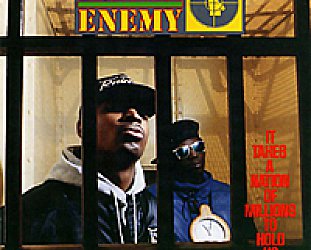

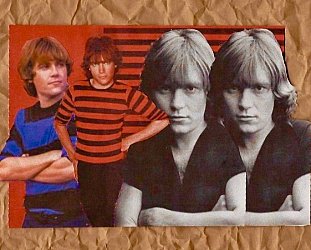

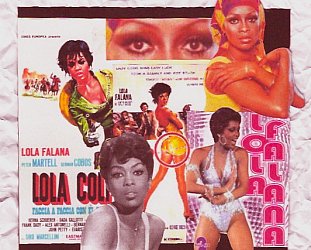
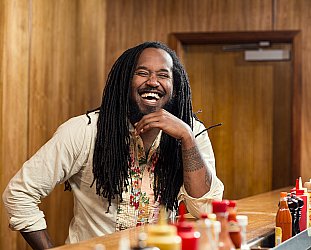
post a comment